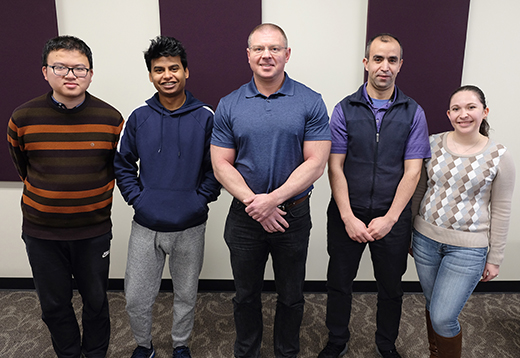New study changes understanding of protein biology in E. coli
Friday, Jan. 31, 2020

From left are members of the Hardwidge research team at Kansas State University: Congrui Zhu, doctoral student in pathobiology; Kamrul Hasan, doctoral student in pathobiology; Philip Hardwidge, microbiologist and biochemist; Samir El Qaidi, postdoctoral associate; and Kristina Eichhorst, master's student veterinary biomedical science. | Download this photo.
MANHATTAN — The conventional wisdom behind the biological activity of a group of E. coli bacterial proteins has been upturned by new research at the Kansas State University College of Veterinary Medicine.
Philip Hardwidge, a microbiologist and biochemist in the diagnostic medicine and pathobiology department, and Samir El Qaidi, postdoctoral associate, published the results of their newest investigations in the article "An intra-bacterial activity for a T3SS effector" in Scientific Reports.
"Bacterial pathogens interact with cells in their infected mammalian hosts by using what microbiologists call a type III secretion system, or T3SS, to inject virulence proteins into host cells," Hardwidge said. "In some strains of E. coli, the proteins that are secreted by the T3SS help the pathogen combat the host's immune system and contribute to diarrheal disease."
Previously, the T3SS effectors were thought to be inactive within bacterium and only function in the host cells. While performing mass spectrometry experiments, in collaboration with Nichollas Scott at the University of Melbourne in Australia, Hardwidge and his team received surprising data suggesting that one of these T3SS effectors might be active within the bacterium.
"We believe this is the first example of a T3SS effector functioning within both the bacterium and within the host cell," El Qaidi said. "This is important because it causes us to rethink whether this group of proteins has an additional function beyond what has been classically studied."
The researchers now want to understand both the extent to which the example they discovered might be common to other T3SS effectors in other organisms and also explore how these proteins may affect important aspects of bacterial physiology.
"I'm proud of the work performed by Dr. El Qaidi," Hardwidge said. "He took advantage of an unexpected observation, designed several clever experiments to test hypotheses about what might be happening, and conducted technically challenging bacterial genetics and biochemical experiments to confirm this new activity."
Hardwidge and El Qaidi also investigated the same effects in salmonella and C. rodentium, which are other bacteria that cause intestinal infections and diarrhea.
The project was supported by a grant from the National Institute of Allergy and Infectious Diseases to Hardwidge and by National Health and Medical Research Council of Australia project grants to Scott. Hardwidge's team also collaborated with Brian Geisbrecht, professor of biochemistry and molecular biophysics at K-State.
